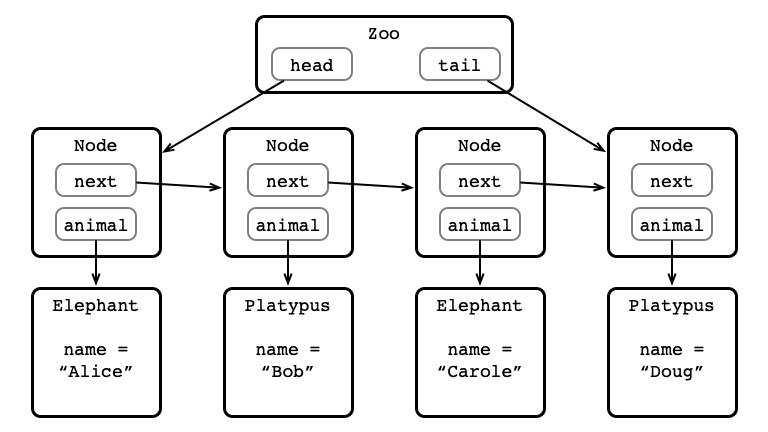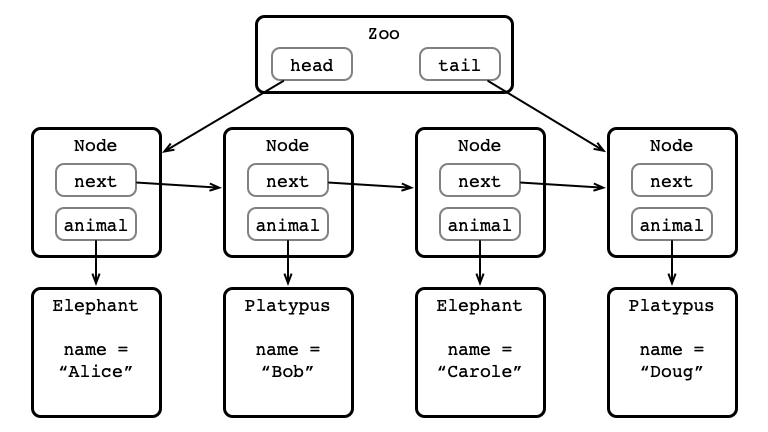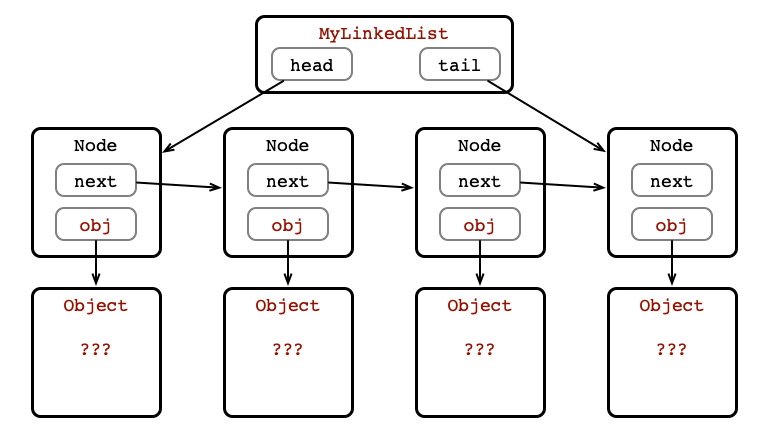Lecture 17: Generic Linked Lists
Announcements
- Lab 06 (forthcoming) due next Friday (4/30)
- last lab assignment
- Project 3:
- assigned 5/3
- due 5/28 (suggested 5/19)
- Weekly Quizzes
- 4/26, 5/3, 5/10, 5/17
- in lieu of exam
- Extension portfolio (optional)
- due 5/28
Overview
-
ZooImplementation - Iterating over the List
- Making the List Generic
Last Time: Zoo as Linked List

We Implemented
-
add(Animal a)to append a newAnimal -
contains(Animal a)to check if anAnimalis in theZoo -
feedAnimals()to feed theAnimals
We discussed remove(Animal a) to remove an Animal
remove() in Pictures

remove() in Code
public void remove (Animal a) {
Node curr = head;
if (curr == null) {
return;
}
if (curr.getAnimal().equals(a)) {
head = curr.getNext();
return;
}
Node prev = curr;
curr = curr.getNext();
while (curr != null) {
if (curr.getAnimal().equals(a)) {
prev.setNext(curr.getNext());
return;
}
prev = curr;
curr = curr.getNext();
}
}
Another Question
With the array Animal[] zoo we could access all of the Animals easily:
Animal[] zoo;
...
for (int i = 0; i < zoo.length; i++) {
// do something with zoo[i]
}
How could we do something similar with the Zoo class?
Idea:
- Store a current node in the
Zoo - Write a method
next()that:- gets the animal stored in the current node (if not
null)- if current node is
null, returnnull
- if current node is
- sets the current node to its next node
- returns the animal
- gets the animal stored in the current node (if not
- Write a method
hasNext()to check if there is a next animal
(We will see a more elegant way using iterators later…)
Testing our Code
Generics
More than just a Zoo
The logic and structure of our Zoo is great!
But what if we want to store things other than Animals?
Zoo

School

Set of Numbers

Same Logic, Same Implementation?
How could we represent a list of anything?
One Idea: Use Object

An Implementation
public class ListOfObjects {
private Node head = null;
private Node tail = null;
public void add (Object obj) {
...
}
public void remove (Object obj) {
...
}
public boolean contains (Object obj) {
...
}
public Object next () {
...
}
}
class Node {
private Object obj;
private Node next;
public Node (Object obj) {
this.obj = obj;
next = null;
}
public void setNext (Node nd) {
next = nd;
}
public Node getNext () {
return next;
}
public Object getObj () {
return obj;
}
}
Why Isn’t This Great?
ListOfObjects list = new ListOfObjects();
list.add(new Elephant("Alice"));
...
Why this Isn’t Great I
ListOfObjects list = new ListOfObjects();
list.add(new Elephant("Alice"));
...
Casting! Every time we access something in the list, it must be cast as the correct type:
Animal a = (Animal) list.next()
This is annoying…
Why this Isn’t Great II
ListOfObjects list = new ListOfObjects();
list.add(new Elephant("Alice"));
...
There is nothing requiring us to use the same datatype
list.add(new Platypus("Bob"));
list.add("Adding a String now");
list.add(Integer.getInteger("3745"));
These operations are perfectly valid!
- No error checking for consistent types!
Generics: A Better Way
Idea: Write a GenericList class that
- can be used to store any specified type of object
- each instance only stores one type
- Java checks that correct types are used
Generic Syntax
Declare class with a type, T:
public class GenericList<T> {
...
}
Inside the class, T can be used like a variable representing the type:
// add an item of type T
public void add (T item) {
...
}
// get next item of type T
public T next () {
...
}
Two Options for Node
- Make
Nodegeneric:class Node<T> { private T item; private Node<T> next; ... } - Make
Nodean inner class:public class GenericList<T> { ... class Node { private T item; private Node<T> next; ... } }
Using Our Generic List
// make lists storing different types
GenericList<Animal> zoo = new GenericList<Animal>();
GenericList<Person> amherst = new GenericList<Person>();
// populate the lists
zoo.add(new Platypus("Alice"));
amherst.add(new Person("Bob"));
...
// these give errors!
amherst.add(new Elephant("Eve"));
zoo.contains("Bob");